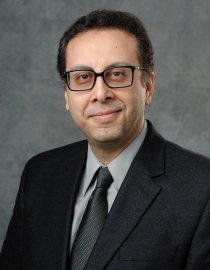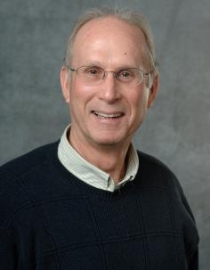MSU Biosystems and Agricultural Engineering professors receive grants to bring agricultural innovations to developing countries
Ajit Srivastava and Pouyan Nejadhashemi are each part of USAID projects to improve agricultural practices in West Africa and South Asia.
Ajit Srivastava, professor in the Michigan State University (MSU) Department of Biosystems and Agricultural Engineering (BAE) and Pouyan Nejadhashemi, MSU Foundation professor in BAE, are each part of teams that have been awarded three-year grants from the Feed the Future Innovation Lab for Sustainable Intensification (SIIL), a USAID program out of Kansas State University (KSU).
Pouyan Nejadhashemi: Geospatial Farming Systems Tools

Nejadhashemi is a member of the Digital and Geospatial Tools Consortium, a $3 million project led by Ignacio Ciampitti, associate professor in KSU’s Department of Agronomy. The project aims to develop digital support tools (i.e. apps, websites) to help guide decision makers and producers in improving food security, human nutrition, and risk management and resilience of smallholder farms, farms that are smaller in size and often owned and operated by families who use the them as a their primary food resource, in Senegal, Cambodia and Bangladesh.
“We are meeting with partners in these countries to identify the challenges that they have. Based on that, we will find the best way to address those challenges,” Nejadhashemi said. “We are going to employ a new way of solving problems. We want to take an evidence-based approach rooted in data, rather than an opinion-based approach.”
Known for his innovative decision-support models, Nejadhashemi will be in charge of modeling integrated animal and crop farming systems, while considering economic and environmental sustainability.
“We want to look at the crop livestock system as one system. Most of the research is focused on one of them individually,” he said. "The model integration is important, as both systems support each other while competing against the same resources, specially at regional and national levels. If you're not considering both of them, you're missing part of the puzzle.”
The University of Minnesota, University of Maryland and University of Colorado are also collaborators on this project. Each team, including Nejadhashemi, will receive approximately half a million dollars to conduct this holistic, comprehensive research.
“Everything in an agricultural system is interconnected. Whatever you're doing in the system is going to affect another part of the system,” Nejadhashemi said. “Our research will provide information to help smallholder farmers and policymakers to enact decisions that take a comprehensive view of the farming system.”
The project team will work together to coordinate educational programs about their research findings and the digital tools they will develop in Senegal, Cambodia and Bangladesh.
“We will have workshops and training to provide stakeholders with knowledge about how our research and tools can be used to advance agriculture,” Nejadhashemi said. “We want to empower them, so that they can continue using and expanding upon this platform.”
Ajit Srivastava: Appropriate-scale Mechanization for Smallholder Farmers

Srivastava is part of the SIIL’s Appropriate Scale Mechanization for Sustainable Intensification Consortium (ASMC), which received a $2.24 million grant to scale technologies for smallholder farmers in West Africa, Bangladesh and Cambodia.
The ASMC is led by Prasanta Kalita, professor of agricultural and biological engineering at the University of Illinois, Urbana-Champaign. MSU team members are: Timothy Harrigan, BAE associate professor; Nanda Joshi, associate professor in the Department of Animal Science; and Ranjani Ananthakrishnan, Ernest W. and Robert W. Schaberg Endowed Chair in Accounting. KSU, North Carolina A&T University and Tillers International are also collaborators.
This new grant builds on a previous project focused on developing technologies for farmers in West Africa and South Asia.
“In Phase I of our project, we were developing new appropriate-scale technologies for smallholder farmers in Burkina Faso. Phase II is about scaling those technologies so they are available for many, many farmers,” Srivastava said. “Phase II is focused on exploring ways to make the technologies more effective, usable and accessible.”
“We are making sure that the mechanization we're developing and testing fits into the local farming system, fits the local customs and values,” Harrigan said. “We’re not just transplanting mechanization from the U.S. and saying, 'here you go.' We're asking, 'what is it going to take to develop mechanization that's going to fit here?’”
“It's really a farming systems approach that involves not only the mechanization, but consideration for environmental and cultural impacts.”
Srivastava and the MSU team will receive $735,000 of the $2.24 million renewal to scale technologies for irrigation, planting, weed control, and forage chopping in West Africa. These technologies will help farmers “do more with less,” increasing yield and resilience for crops such as maize, sorghum, millets and forages.
“Sustainable intensification means increasing productivity of small-scale farmers in a sustainable manner — how can we grow more from the same piece of land sustainably?” Srivastava said. “Mechanization, which is appropriate for small-scale farmers, is extremely important. It entails developing tools to make work that’s done by hand more productive and a little bit easier.”

“We're trying to take the things that we've accomplished and expand it so it creates demand,” Harrigan said. “We want to get this equipment in the hands of more people so that they can make the adjustments in their farming systems that are necessary to reduce the drudgery of farming by hand.”
In Phase I, the MSU team focused mainly on Burkina Faso. In Phase II, the focus of his research will expand to Western Africa, as Srivastava and his colleagues work to establish a technology hub for Western Africa in Senegal.
“We are actually going to establish a technology park where we can develop new technologies and test them, bring private sectors, as well as farmers, to demonstrate and see which ones have the best potential for application in the Western African regions,” he said.
A similar hub will be established in South Asia. These hubs will have a director, an advisory committee, and work with local universities and farmers to allocate land for testing, development and teaching.
“We want to establish a collaboration between the Western Africa hub and the Asia hub and make sure that they are communicating directly with each other to share knowledge,” Srivastava said.
Local farmers, professionals and students are directly involved in helping the MSU team identify problems and appropriate solutions. This is important for sustained success once the project ends.
“We will not be there forever, but we want to create an ecosystem of innovation where they feel comfortable trying something new on their own. Let's not just do what we have done forever, and what is safe, (what) we know,” Srivastava said. “Let’s experiment and explore new, innovative solutions.”



 Print
Print Email
Email




